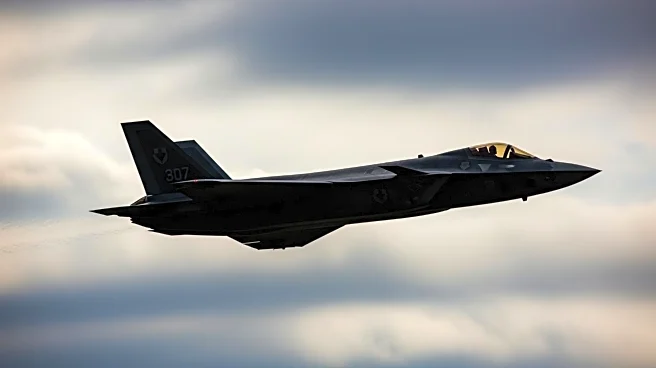What is the story about?
What's Happening?
In a notable incident from 2013, a U.S. Air Force F-22 Raptor stealthily intercepted two Iranian F-4 Phantom fighters that were approaching an American MQ-1 Predator drone in international airspace. The Raptor, piloted by Lt. Col. Kevin 'Showtime' Sutterfield, managed to shadow the Iranian aircraft undetected due to its advanced stealth capabilities. Upon closing in, the Raptor pilot advised the Iranian fighters to 'go home,' prompting them to disengage. This incident highlights the F-22's ability to defuse potentially dangerous situations without engaging in combat. The event was later confirmed by then-Air Force Chief of Staff Gen. Mark Welsh, emphasizing the strategic advantage provided by the F-22's low observability and sensor technology.
Why It's Important?
This incident underscores the strategic importance of advanced stealth technology in modern military operations. The F-22 Raptor's ability to operate undetected allowed the U.S. to avoid a potentially hostile encounter without resorting to force. This capability is crucial for maintaining air superiority and protecting U.S. assets in contested regions. The event also illustrates the ongoing tensions in international airspace, particularly involving U.S. and Iranian military forces. The successful de-escalation of this situation without conflict demonstrates the effectiveness of advanced military technology in preserving peace and stability.
What's Next?
While the specific incident occurred in 2013, it highlights ongoing strategic considerations for U.S. military operations in the region. The U.S. may continue to deploy advanced aircraft like the F-22 to ensure the safety of its drones and other assets operating near potentially hostile territories. Future encounters may prompt further diplomatic or military responses, depending on the geopolitical climate and the actions of other nations involved.
Beyond the Headlines
The incident also raises questions about the rules of engagement and the ethical considerations of using advanced stealth technology in international airspace. The ability to operate undetected can be a double-edged sword, offering strategic advantages while also posing challenges in terms of transparency and accountability. As military technology continues to evolve, these ethical and legal dimensions will likely become more prominent in discussions about international military operations.

















